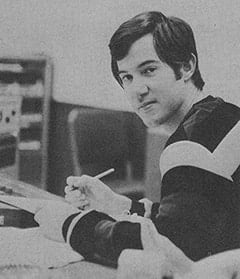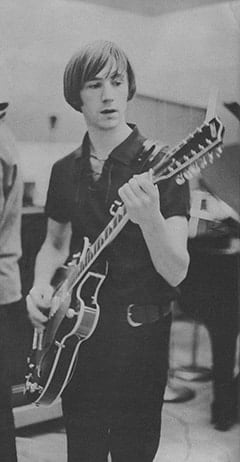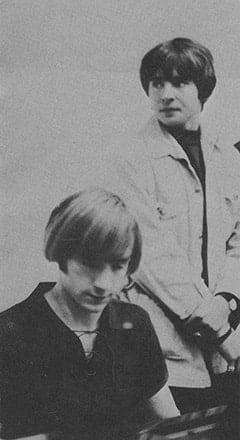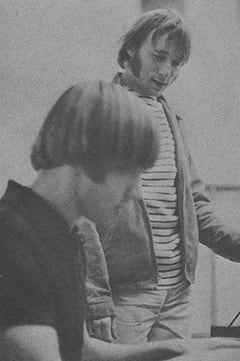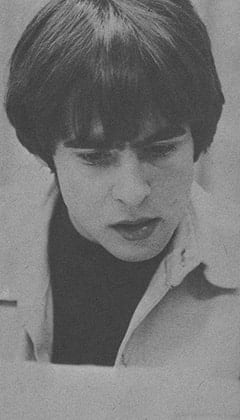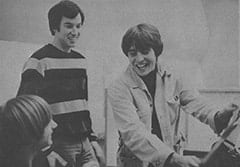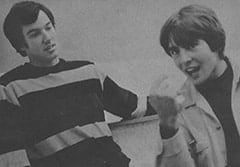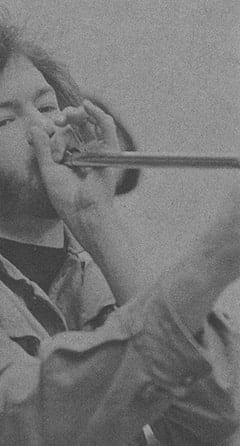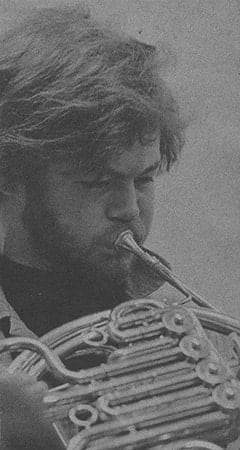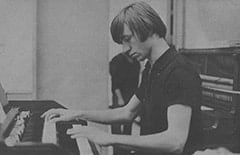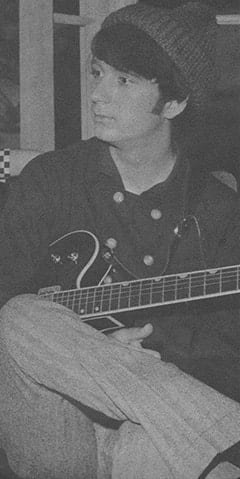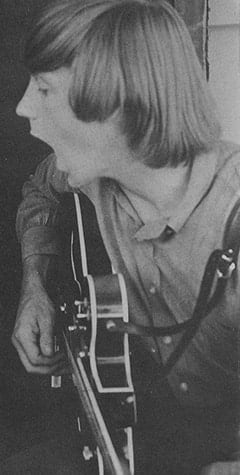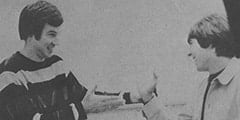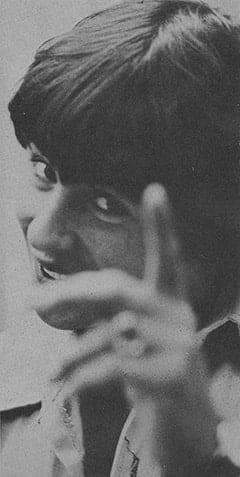Chip Douglas, the Monkees’ young record producer, tells all about what happens when these four groovy guys make music:
How did you come to be their producer?
I was working at the Whiskey a Go Go with the Turtles over Thanksgiving and Mike Nesmith came up to me and said, “Gee, we’ve been looking all over the place for you and couldn’t find you. We’re in need of someone to produce us playing our own instruments. Up to this point we haven’t been able to, we’ve just been singing over tracks. So I thought I would lay this in your lap… food for thought.”
At the time they were considering some other people too, but I don’t know who they were. About three weeks later I got a call on the phone and they said “yes, we’re all set.” For a while nothing much happened and then finally we got off the ground and got it rolling. We got into the studio, started working and got used to each other and everything.
Had you met any of the Monkees before this?
I knew Mike only briefly, I had spoken to him. I knew who Peter was, but I didn’t know his name. I had seen him around the Troubadour and out in Huntington Beach at the “Golden Bear” and I’d see him working in the kitchen and he was a familiar face, but I didn’t know his name. He always said hello and I said hello.
I remember Mike came in one night at the Trip when I was working there with the MFQ. It was about the time Donovan was there, I think, and we talked awhile about the MFQ and about what we were doing and that’s about as far as it went.
When they first came to you, what did they say they wanted to do with their music? What did they have in mind?
They wanted to do better songs. They mainly wanted to play themselves… they wanted the music to be theirs. They needed somebody to produce the group. A fifth Monkee, so to speak, a leader of the group. They didn’t have a leader because they were all assembled, and it was wise for them to stay without one, too.
Did you do much talking about what you were going to do before you went into the studio? What part were you going to play?
It was understood from the very first conversation that we had that I was to be the producer. This entails helping them choose material and making sure the sounds they play out in the studio go down on tape right, and making sure the arrangement of the song is the best that it can be, and helping to decide who is going to sing lead. They can argue for hours on who is going to sing lead on a song. So one guy just has to say so and so has to sing it, it will be best for him. This saves a lot of trouble, sometimes feelings are hurt, but they get over it.
I’m responsible for what’s happening on the records, what songs go down and everything else. At this point, the record company suggests songs, they just give us dubs and the boys and I go over them and decide which ones we want to do and which ones we don’t want to do. If one guy doesn’t want to do a particular song, we do it anyway. We have enough songs so that we can choose what we want to do and put it to a vote.
Had you done any producing before you began with the Monkees?
None. Just arranging. But I was familiar with it, because I had paid much attention to producing, getting the sounds down on tape and all that stuff. I was always interested, but I had never taken the time to try it. I was thinking of getting into producing more and more. I was experimenting, so I made some tapes on a couple of songs that I wrote which the guys have on their new album. One tune that I wrote, I produced with myself singing it a long time ago—just sort of experimenting, but it was worthwhile because I learned a lot.
Have you been arranging their songs?
No, most of them are already arranged on the dubs. We make little changes and there are some songs, like one tune on the album I had a hand in arranging. It’s called “Early Morning Blues and Greens”—one of the songs Mike wrote. He had the whole arrangement in mind. I just sort of improved where I could… a little chord change here or there… a little harmony change here and there. I arrange most of the harmony parts and the background voices.
Has there ever been an occasion where one of the Monkees has written a song and you have another good song and maybe the outside song was a little bit better, which would you use?
They know when they have written a good tune. I keep an impartial eye on which is a good song, which is a bad song. The first song that Peter wrote, he never really finished. I told him why I didn’t like the ones he started and it made sense to him and then he wrote this one song that turns out to be one of the better songs on the album. It’s called “For Pete’s Sake.”
Have they been doing more writing since the first couple of albums?
Micky has especially. He has written this one very far out thing. It starts out with a kettle drum that sounds like thunder, it’s great!
Have you added anything new in the way of electronics or sound?
Yes, we hope to. We didn’t do too much this time because we haven’t had a lot of time to get into it. We want to do a lot of that stuff, but we don’t want to over produce anything. We’ve been using a lot of pedal steel guitars on this album. Mike plays it and in some songs he has a lot of nice effects. It has echoes in a tune called “Mr. Webster.” Mainly we use good arrangements. We didn’t try for any gimmicks this time. When a song calls for it we’ll put it in.
Can you describe what a typical session is like?
We really don’t get started until the evening, that’s when everyone wakes up. We usually start about noon and go to midnight, sometimes one, but we wouldn’t really “get into it” until about nine o’clock. From nine to one would really be our productive time. Everybody would be warmed up and awake. So those critical times between nine and eleven we would really work on it. Sometimes during the day we would have four tracks, two in the afternoon and two at night, but that only happened once. However, it was enough to get us ahead on the album. We used three of those tracks, they came out very well.
Is there one Monkee that comes in more tired than the others?
Peter is the most wide awake. Mike is also equally wide awake. He gets up in the morning, has a good breakfast because he’s married. Micky is the most sleepy when he comes in in the morning. He’s always tired. Davy is a little sleepy, too. They’re kind of “night people,” both of them.
Can you explain how the session goes?
Well, it depends on the session. Some days we breeze right through things and other days we argue a lot… about what the song is going to be like. It’s a matter of everybody finding their “corner.” The professional musician finds this the easiest, but every musician, after a while, begins to find what is known in a jazz term as “groove” on his own instruments. In other words, what he does is he starts playing something that he digs a lot and keeps that certain little part. Like Micky on the drums… he’ll make up a riff and flip himself out and that puts him up about three stages, he gets elevated and very excited. Then the session gets frantic and everybody starts running around. They get so anxious to do a take! They get mad at me sometimes because I want to wait to make sure all the little parts are right and the arrangement is right. But that’s what I’m there for, anyway. It’s difficult to talk to all four guys at once and keep them all happy, but it works out.
How about at the end of a session. Is there any kind of ritual they have for leaving or saying good bye?
Various people file out at different times. It seems like everybody always wants to do more by the time the end of the session rolls around they’re just getting going by that time. Some nights they’re really tired by the end of the session.
Is there anyone in the group who has a bigger temper than the others?
Micky is the only one who really doesn’t get mad and storm out. Peter doesn’t either. I think Davy stormed out once.
What would cause someone to really get angry?
If things aren’t going well. I’ve stormed out a couple of sessions myself. We all do at various times. It happens when everything isn’t happening. You can tell when it is happening… everybody is happy and playing their little instruments and they get really excited about it. If you’re working early in the mornings and you try to get it to happen and it doesn’t everybody gets very depressed and all you have to do is stop the work and have a little group therapy session. Looking back on the month we worked on the third album, we should have had a few more of these. We might have gotten more things done. We had to push to get the third album out in time. We had a lot of work to get done in a month.
